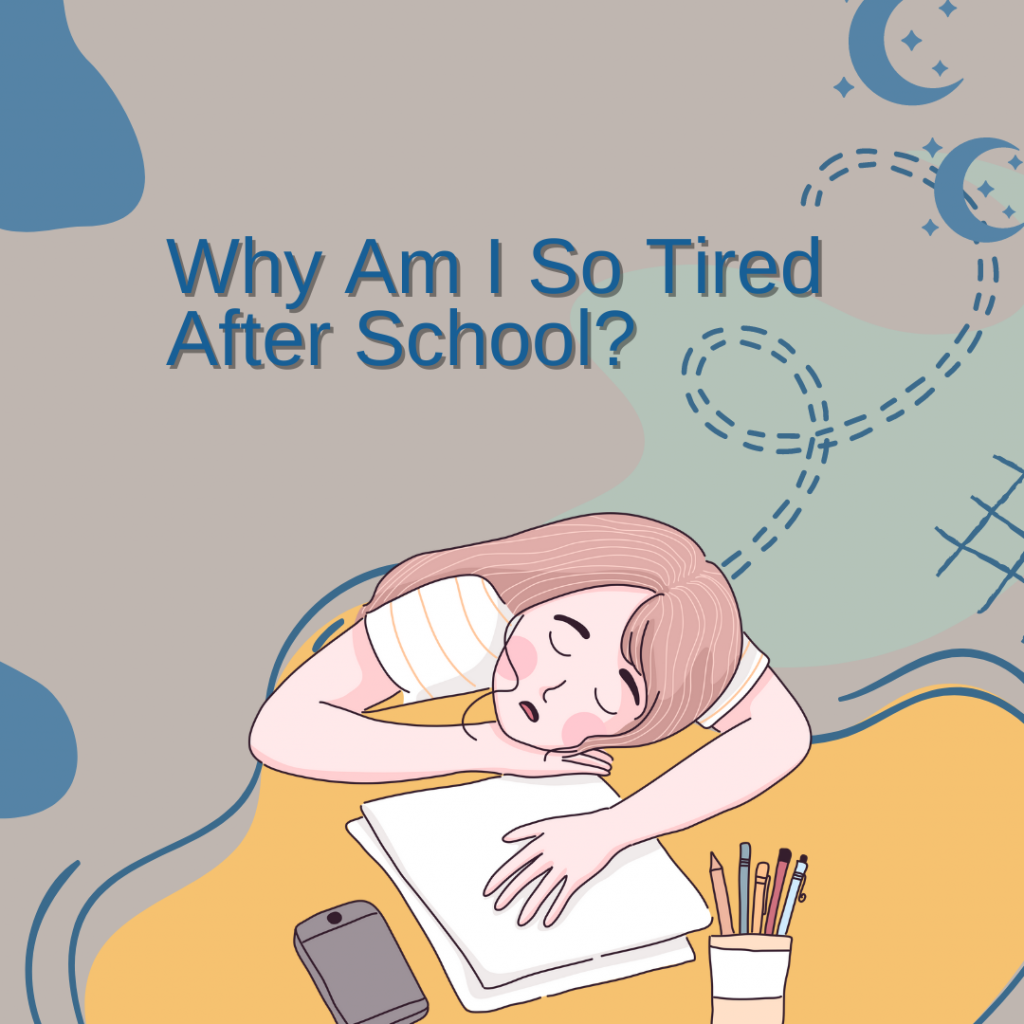It’s no secret that school can be exhausting. From elementary school to high school. Between early mornings, long days, and homework assignments, it’s hard to stay energized until the very end.
So why do we feel so tired after school? The answer lies in the way our brains are wired. Let’s learn more about why so many students feel tired at the end of the day.
Is school making me tired?
Children may feel drained after school for a variety of reasons and want to know the answer to “why am I always so tired after school?” One reason may be that they are not getting enough sleep. The National Sleep Foundation recommends that elementary school students get at least 10 hours of sleep each night.
A lack of exercise can also be a factor that leads to fatigue. Children who spend most of their day sitting in a classroom may not have the energy to play outdoors or participate in physical activity when they get home, so when they eventually do go outside and play, they may have shortness of breath, if this does happen, you may have to call your doctor.
Finally, stress can also be a factor. Children who are feeling overwhelmed by schoolwork or social pressures may feel tired and stressed out. Any of these factors can lead to chronic fatigue and a lack of energy. Addressing the root causes of fatigue in children can help them feel more energetic after school and support their mental health.

What makes children stressed?
There are many factors that can lead to stress in children. One major cause of stress is pressure from schoolwork. Many students feel overwhelmed by the amount of homework they are given and the pressure to get good grades. This can lead to a lot of anxiety and stress.
Furthermore, social pressures can also be a source for children. They may feel like they need to fit in with a certain group or be popular and may feel pressure to act a certain way.
Additionally, changes such as moving to a new school or losing a loved one can also lead to stress in children. Any event or change that is overwhelming or difficult for a child can cause stress. Symptoms of stress in children can include headaches, stomach aches, disruptive sleep patterns, and feeling overwhelmed or anxious.
If a child is frequently experiencing these symptoms, it is important to address the sources of stress in their life. Addressing the root causes of stress can help children feel more comfortable and relaxed.
What is the recommended amount of sleep for children and why?
Sleep is important for everyone, but especially for children. The National Sleep Foundation (NSF), as previously mentioned, recommends that children between the ages of 6 and 13 get 9 to 11 hours of sleep a night, and teenagers get 8 to 10 hours, so they have plenty of rest. However, if sudden extreme fatigue in children is present, then parents will need to flag that up with their doctor.
There are a few reasons why getting enough sleep is so important for kids. First, during sleep, the brain consolidates memories from the day. This means that information is transferred from short-term to long-term memory, which is important for students as they learn new material.
Second, sleep allows the body to rest and restore its energy levels. When kids are tired all the time, they can become cranky and irritable, which can negatively affect their schoolwork and relationships. If this carries on for too long, a sleep disorder may appear.
Finally, sleep helps the body regulate its hormones. This is important for kids because their hormones are still developing and need to be kept in balance. When they’re not getting enough sleep, this can lead to problems such as difficulty focusing, poor decision-making, and mood swings.

Tips on how to stay awake during class time
There are various methods that students can use to stay awake during class time. Some of these methods are as follows:
- Get plenty of sleep the night before class. This is one of the most important things that students can do in order to stay alert during class. If they are well-rested, they will be less likely to doze off during class.
- Drink plenty of water. Dehydration can make it difficult for students to stay awake, so it is important that they drink plenty of water during the day, especially if they are going to be in class for a long period of time.
- Eat healthy snacks. It is important for students to have balanced meals throughout the day, and this includes snacks. Healthy snacks such as fruits and vegetables can help keep students’ energy levels high and their focus sharp.
- Take breaks. It is important for students to get up and move around every once in a while. This will help them stay awake and alert, so they don’t fall asleep in class.
- Stay away from caffeine. While caffeine can help students stay alert in the short term, it can also have negative effects on their energy levels and focus later in the day. For this reason, it is best for students to avoid caffeine altogether if they want to stay awake during class.
READ MORE: How to help distracted students refocus
All of these tips can help students stay awake and alert during class time so they can avoid burnout and provide them with a better outcome at school.
The benefits of getting enough sleep each night
Experts say that children who get enough sleep during the night have better grades, improved behavior, and are less likely to be overweight or obese, so will not need to look into weight loss help. They also have a decreased risk of developing chronic diseases like diabetes and heart disease. Additionally, children who get enough sleep tend to be more alert and attentive in class. So, it’s important for students to get a good night’s sleep in order to perform their best in school.
How children can get a good night’s sleep
When it comes to getting a good night’s sleep, there are a few things that parents can do to help their children get the most out of their slumber. For starters, it’s important to create a bedtime routine and stick to it as closely as possible. This could involve reading a book, completing a set of relaxation exercises, or simply chatting about the day’s events.
It’s also important to make sure that children have a relaxing environment in which to sleep – this could mean avoiding bright screens before bedtime, using calming colors in the bedroom, and banning disruptive noise-makers such as televisions and phones.
And finally, it’s crucial that children get enough exercise during the day – this will help them to feel tired and ready for bedtime. By following these tips, parents can ensure that their children get the best night’s sleep possible. Sweet dreams!

